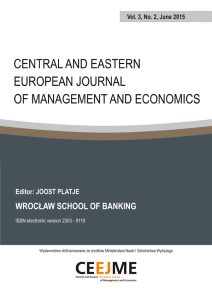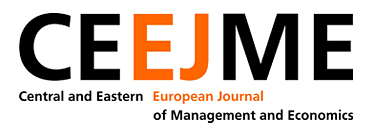 CENTRAL AND EASTERN EUROPEAN JOURNAL OF MANAGEMENT AND ECONOMICS
CENTRAL AND EASTERN EUROPEAN JOURNAL OF MANAGEMENT AND ECONOMICS
Vol. 3, No. 2, June 2015, WROCŁAW SCHOOL OF BANKING
Editor: Joost Platje
Contents: PDF download >>
Cover: PDF download >>
Wydawnictwo dofinansowane ze środków Ministerstwa Nauki i Szkolnictwa Wyższego
Vol. 3, No. 2, 105-126, June 2015
Open Pension Funds market after reform of 2014 – the global perspective
Author: Sebastian JAKUBOWSKI
Wrocław University, Poland
Article: PDF download >>
Abstract: The beginning of the second millennium coincided with major pension reforms in many countries. This global movement also included Poland where a pension market was created in 1999. The first 15 years were a period of expansion of Open Pension Funds market in Poland. This changed with the Reform of 2014, which brought new standards applicable to OFE investment policy. Half of the assets were transferred to Social Insurance Institution (ZUS) and legal investment limits for Open Pension Funds undergone a major changes. Evolution of investment policy of Open Pension Funds during last fifteen years is analyzed with special emphasis on the global perspective.
Keywords: social security, public pensions, retirement plans, private pensions, business and securities law, non-bank financial institutions, financial instruments, institutional investors
JEL: H55, J32, K22, G23
Vol. 3, No. 2, 127-140, June 2015
Financing renewable energy projects through regional operational programmes
Author: Michał PTAK
Wrocław University of Economics, Poland
Article: PDF download >>
Abstract: Regional operational programmes provide support granted from EU funds for different projects implemented in individual voivodeships in Poland. The aim of the programmes is to improve the competitiveness of regions and to promote the sustainable development. The priorities of the regional programmes include inter alia transport, environmental protection and sustainable energy production. The aim of the article is to analyze the support provided from chosen regional operational programmes for projects in renewable energy in Poland. The projects aimed at increasing the amount of electricity or heat produced from renewable resources and included for example modernisation of hydroelectric power plants or the installation of solar thermal collectors. The article discusses the effects of the support and difficulties in implementation. The analysis included regional program documents and data on the support provided.
Keywords: renewable energy, regional operational programmes, the 2007-2013 programming period
JEL: O13, Q28, Q42
Vol. 3, No. 2, 141-154, June 2015
The impact of the Regional Operational Programme for the Lower Silesia Voivodeship for 2007-2013 for the environment and infrastructure for environmental protection in the voivodeship
Author: Bartosz BARTNICZAK
Wrocław University of Economics, Poland
Article: PDF download >>
Abstract: State of the environment and environmental infrastructure is one of the factors determining the quality of life of residents in a given territory. The main objective of the Regional Operational Programme for the Lower Silesia voivodeship for 2007-2013 was to increase the level of living in Lower Silesia, and to improve the competitiveness of the region while respecting the principles of sustainable development. Implementation of this objective was to be achieved through the implementation of the objectives assigned to individual priorities. The aim of the priority IV Environment and Ecological Safety was the improvement of the environment, preventing its degradation and conservation of biodiversity and natural assets of Lower Silesia, as well as the improvement of safety in the region through counteracting natural and technological risks and eliminating their effects and to support active in this range of emergency services. Objective of the study is to show how the implementation of projects funded under Priority IV contributed to improve the environment and infrastructure for environmental protection. For this purpose, will be compared with the results of completed projects statistics regarding the state of the environment and environmental infrastructure in the region. The analysis will be carried out in the various environmental components that correspond to the thematic focus of the various activities carried out under Priority IV. The analysis will therefore be conducted in the area of waste, water and wastewater management, air quality, flood protection infrastructure, restoration of degraded land, protect the environment from natural and technological risks and to protect biodiversity.
Keywords: Regional Operational Programme, environment, Lower Silesia Voivodeship
JEL: H25
Vol. 3, No. 2, 155-160, June 2015
Dysfunctional Leadership – Management in the CSR-case
Author: Markus WILL University of Applied Sciences Zittau/Görlitz (Germany)
Jorg HAIDIG IHI/TU Dresden (Germany)
Joost PLATJE Wrocław School of Banking (Poland)
Article: PDF download >>
Abstract: Regarding CSR, most business is likely to focus on win-win solutions, neglecting interactions in complex system. Trade-offs are often not identified or considered. This may lead to unexpected side effects of actions in the future. The aim of this article is to identify the most important contradictions / trade-offs in CSR management as well as management practices to deal with these trade-offs.
Keywords: CSR, trade-offs, dysfunctional management
JEL: M14
Vol. 3, No. 2, 161-173, June 2015
Connecting sustainability initiatives with efficiency measures: an opportunity for business schools
Author: Wim LAMBRECHTS University Colleges Leuven-Limburg and University of Antwerp (Belgium)
Luc VAN LIEDEKERKE University of Antwerp and Antwerp Management School (Belgium)
Sara RYMENAMS University Colleges Leuven-Limburg (Belgium)
Article: PDF download >>
Abstract: One of the essential parts within the transition towards sustainable economies, is the way how higher education prepares its students for their future role in business. In order for them to contribute to corporate social responsibility within the enterprise context, they need specific skills and competences related to sustainable development. Derived from the societal role of business schools in preparing the future business leaders and entrepreneurs, the focus of this paper is the contribution of business schools to sustainability integration. The topic could be wider situated within the context of higher education for sustainable development, which aims at integrating competences for sustainable development into the curriculum, and integrating sustainability measures within campus operations, research and societal role. This reflective article looks at a business school context as a case for institutional efficiency measures. It describes how business schools could implement efficiency measures and apply instruments within their own context, looking at the campus as a ‘living laboratory’ for sustainability innovation. Three tools and instruments to foster sustainability integration on campus, its benefits and possible problems are described: Assessment Instrument for Sustainability in Higher Education; Ecological Footprint Analysis; and Principles for Responsible Management Education. It builds upon the data and results from several action research projects within two Belgian business schools. As a conclusion, the article reflects upon the essential characteristics of these initiatives, as a way to connect sustainability initiatives to efficiency measures. This may be an opportunity for business schools, not yet used to its full potential yet.
Keywords: AISHE, business school, ecological footprint analysis, efficiency measures, higher education, PRME, sustainability
JEL: I21, I23, Q01, Q56
